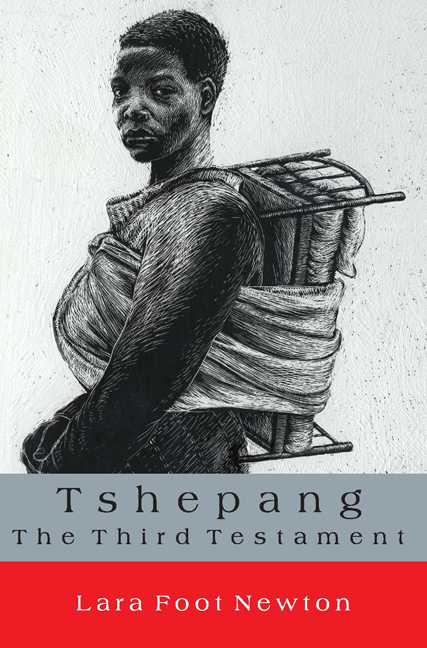Foreword
Published online by Cambridge University Press: 04 October 2019
Summary
It was 16 June – a chilly winter afternoon on the public holiday that commemorates the start of the student uprising of 1976. Lara Foot Newton had invited me to see a full run of Tshepang - The Third Testament days before it was to have its world premiere in Amsterdam.
There we were in a freezing Scout Hall in Irene, near Pretoria. The play had travelled from the Newton's garage up the road, where it had been created with great passion and scant financial support. At first glance the serenity and gentility of this walled-off security-conscious traditionally white suburb, with its English country lanes, was at odds with the turbulent history of June 1976, as it was with what ensued thereafter.
Not for long. Nothing prepared me for the devastating honesty, the searing innovation about to be unleashed within those colonial walls.
Suddenly I was in the Kalahari. Large bags of salt were suspended over the playing area, which contained fascinating props. Kholeka Qwabe, as Ruth, a tiny empty bed strapped to her back, sat mutely on a pile of coarse salt, which she loudly rubbed into animal skins. Breaking the tension, and the silence, was Mncedisi Shabangu as Simon. From his opening conspiratorial words it was quite clear that he was the storyteller in charge. Shabangu's characteristic energy had been channelled into the evocation of this gossipy platteland sage whose colourfully idiomatic language, in English and Afrikaans, vividly evoked time and place.
Before the preview the writer-director had briefed me about the intensive year-long research she had conducted for this, her first script which formed part of her studies for her Master's degree. Actor Bheki Vilakazi had spent time in Louisvaleweg, the Northern Cape community where the infant ‘Tshepang’ had been raped in 2001. In addition, Foot Newton had scoured websites and newspaper clippings and had consulted specialists on child abuse.
Her investigations into South African male abusers revealed a profile of boys raised in dire poverty, who had either witnessed violence against children or been abused themselves. As adults they faced a bleak future in a sociopolitical apartheid-reinforced wasteland where employment was not an option. Nor was finding a job, or a new life, elsewhere. As the play progressed all these elements emerged, not didactically, but as deeply ingrained text.
- Type
- Chapter
- Information
- TshepangThe Third Testament, pp. xiii - xviiiPublisher: Wits University PressPrint publication year: 2005



